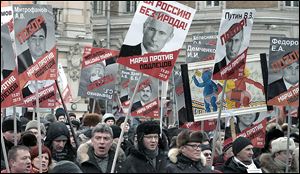
Russians protest ban against U.S. adoptions
Demonstrators want better lives for orphans
1/14/2013
People carry posters of Russian President Vladimir Putin during a protest in Moscow against Parliament’s ban on U.S. adoptions. Many questioned the moral principles of a ban in a nation with so many children in foster care or orphanages.
MOSCOW — Thousands of Russians marched Sunday in condemnation of the Russian Parliament’s move to ban adoptions of Russian children by U.S. families, an event called a “March Against Scoundrels.”
Participants carried posters showing the faces of lawmakers stamped with the word “shame.”
Marchers flooded tree-lined boulevards for many blocks. Police estimated the turnout for the march, which was sanctioned by city authorities, at 9,500. Activists who made a count told Interfax the participants numbered about 24,000.
Many participants had emotional answers for why they took part in the march. Many questioned the moral principles of a ban on adoptions by Americans in a country with so many children in foster care or orphanages.
“Even I can’t afford to adopt, and I’m supposedly middle class,” said Yekaterina Komissarova, 31, adding that perhaps the issue angered her so deeply because she is the mother of two children.
Tamara Nikolayeva, 62, raised her voice, nearly shouting, as she accused Russian leaders of using orphans as pawns.
“They have decided to settle a score by using children, and it’s shameful,” Ms. Nikolayeva said, as her friends nodded. “OK, maybe at some point, it will be better not to give our children away; we should take care of them ourselves. But first you have to make life better for them here. Give them a chance to study. Give them a chance to get medical treatment.”
The adoption ban has underlined a growing division in Russian society, as the government has embraced conservative rhetoric tailored to voters in the heartland and turned away from prosperous city-dwellers who have mobilized over the Internet.
State-controlled television has regaled Russians with reports of U.S. parents who abuse or neglect Russian children.
Russian President Vladimir Putin approved the adoption ban in December as part of a broader law retaliating against the United States for the so-called Magnitsky Act, an effort to punish Russian officials accused of human rights violations.
Russian officials have railed for years about what call light sentences in cases in which U.S. parents abused or neglected youths adopted from Russia.
More than 650,000 children live in foster care or orphanages in Russia; about 120,000 of them are eligible for adoption. Many children in orphanages are sick or disabled, and most have little hope of finding permanent homes.